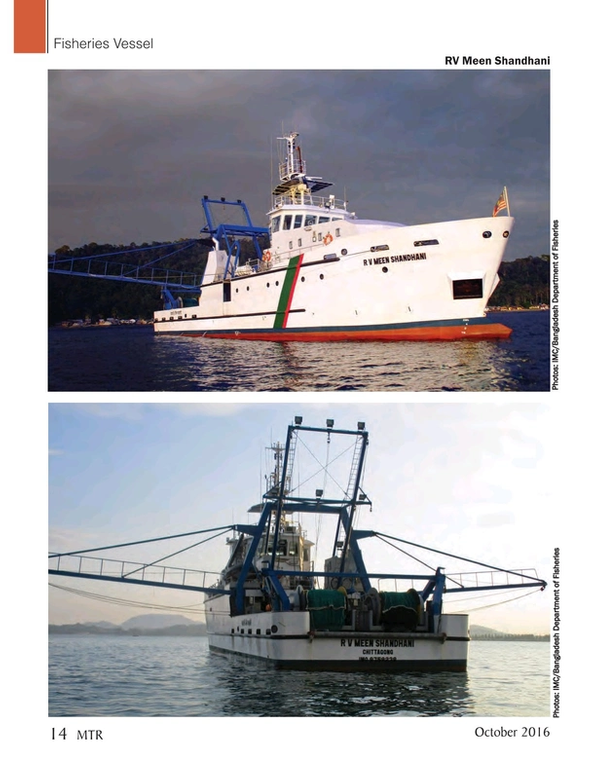IMC’s latest fisheries research and survey vessel design was built in Malaysia for the Bangladesh Department of Fisheries. RV Meen Shandhani arrived in Bangladesh in June after completing extensive sea and fishing trials and its delivery voyage. The Australian consultancy’s naval architects and engineers drew on a wealth of relevant experience, data and expertise when developing the vessel’s design. Formed in 1994, IMC and its principals have a long interest in, and association with, the fisheries sector. Managing Director Justin McPherson worked in Australia’s Northern Prawn Fishery before training as a naval architect and the company’s design library now includes projects covering longliners, purse seiners and pearling vessels, as well as research vessels such as the 35.8m RV Solander and 22.6m RV Naturaliste. IMC is currently finalizing a prawn trawler design to address the Australian fisheries’ ageing fleets.
Built at the Sumber Samudra shipyard, the 37.8m Meen Shandhani is capable of mid-water, bottom and otter board trawling, as well as oceanographic research including sea bottom and water sampling. The main deck layout reflects these diverse capabilities, with a net roller, trawl gallows and twin 2,000m capacity single drum net winches, each capable of eight tons pull at 22m per minute, located aft to support stern trawling. Central to all trawling operations are a pair of trawl winches, each of which can store 2,400m of 16mm steel wire rope and provide 10 metric tons pull at 22.5m per minute. Bottom, mid-water and shrimp trawl nets are of Korean design manufactured in Malaysia by Jaya Nets, while the otter boards are from BMI in Korea. Forward of the trawl winches, beneath the shelterdeck, there is a stainless steel/aluminum semi-contact plate freezer to port, while IMC designed an alcove into the starboard side. The alcove enables specialist hydrographic tools such as conductivity, temperature and depth (CTD) packages and water sampling equipment to be safely deployed and retrieved, with lifting accomplished by a dedicated A-frame and hydraulic winch combination located on the deck above.
The equipment can be transferred into the purpose-designed wet lab immediately forward of the alcove using an overhead Toyo monorail and electric hoist system. Further reflecting the important scientific and sampling work the vessel will undertake, a dry lab is located ahead of the wet lab. This space also includes a dedicated instrument store. The remainder of main deck is used for accommodation, with a large combined crew amenities and laundry space; galley; and mess/recreation space; as well as two cabins, each providing two berths for scientific personnel.
The shelter deck area also provides the access to the vessel’s 90 cu. m. fish hold. Located just forward of amidships on the lower deck the hold can be cooled to -22°C. IMC’s design also incorporates an 11 cu. m. refrigerated sea water (RSW) tank that can be maintained at -1°C. Bitzer compressors and condensers, and Desmi condenser pumps, are used for the RSW, plate freezer and fish hold refrigeration systems.
Aft of the fish hold are tank spaces, including double-bottom fuel tanks and the RSW tank, and the research vessel’s large machinery space. Propulsion power comes from a single Cummins QSK38-M engine with the heavy duty rating of 1,400 hp at 1,800 rpm. This drives a fixed pitch propeller through a 6:1 reduction Hitachi Nico/Twin Disc MG-5506 gearbox. Mentrade supplied the propeller, stern tube, shafting and rudder package. Engine control and steering systems are from Kobelt.
The machinery space also houses a pair of 150kW, 50Hz generators powered by Cummins QSB7-DM engines and the two 75kW hydraulic power packs for the fishing deck equipment. A workshop area is located against the bulkhead that separates the machine space from the steering gear compartment, which also houses fresh water tanks port and starboard.
Navigation electronics are primarily Furuno (including X- and S-band radars, DGPS navigator, log, GPS plotter/echo sounder) with Raytheon Anschütz selected for the autopilot and GPS; Hapcon for the bridge navigation watch alarm system; and Haiyang for the AIS. Furuno also supplied a color scanning sonar and Doppler current indicator, while a Samyung unit was specified for the net recorder. The only exceptions to the use of Furuno communications equipment are the SARTs (Samyung) and EPIRB (McMurdo). A four camera HKVision CCTV system is also fitted.
Outside on the forecastle deck are the hydrographic winch and associated control station, plus a 4.2m Hwayan rigid inflatable work/rescue boat and associated davit. Meen Shandhani is classed by Bureau Veritas with I * Hull *Mach Special service / Research shipUnrestricted Navigation. Its steel hull has a molded beam of 9.2m, depth of 4.6m and design draft of 3.3m corresponding to a deadweight of just over 194 tons. It is expected to commence extensive fisheries resource surveys in the Bay of Bengal.



